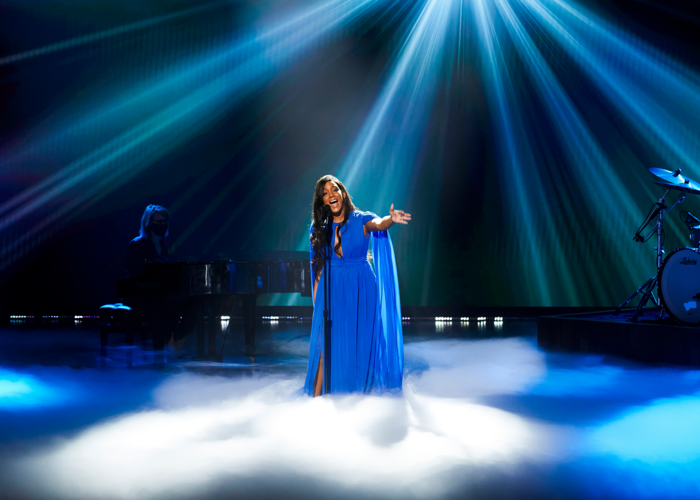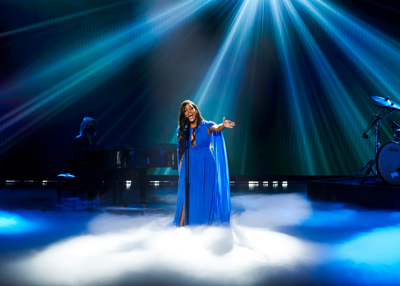
Mickey Guyton on the 56th Annual ACM Awards
Prior to 2020, the Academy of Country Music Awards had become the industry’s glitzy kickoff to the summer season: a weeklong celebration anchored by massive outdoor concerts and fan-driven events led up to the yearly ceremony in Las Vegas. But when the pandemic hit last spring, that party atmosphere was replaced with a subdued and somewhat more sophisticated broadcast which was moved from the chaos of the Vegas Strip to historic venues across Nashville.
On Sunday, the ACMs returned to that Music City-focused strategy for their 56th annual awards show. With the topic of inequality for Black artists in country music at the forefront this year, the organization made some obvious (albeit incredibly late) strides forward. Grammy award nominated country singer Mickey Guyton became the first Black woman to co-host the ceremony alongside Keith Urban. She quickly cemented herself as one of the best hosts in the ceremony’s history, and blew everyone away with her uplifting, mid-show rendition of “Hold On.”
Jimmie Allen, who performed his single “Freedom Was a Highway” with Brad Paisley on the broadcast, also became the first Black musician in the awards’ 56-year history to be named New Male Artist of the Year. The War and Treaty gave one of the best performances of the night, slaying a bluegrass take of U2’s “Pride (In the Name of Love),” with assists from Dierks Bentley and Larkin Poe and filmed at the Station Inn. Collaborations were the cornerstone of this year’s ceremony, and managed to add excitement without feeling like a marketing ploy. Miranda Lambert’s harmonies on Chris Stapleton’s “Maggie’s Song” added another layer of heartbreak, while gospel legend CeCe Winans’ collaboration with Carrie Underwood helped to elevate the country star’s already mind-boggling vocals during their medley of beloved Christian hymns.

Brothers Osborne on the 56th Annual ACM Awards
Brothers Osborne offered two incredible performances during the show. It was one of their first public appearances since T.J. Osborne came out publicly as gay in February — a revelation that just a decade ago would have likely brought his career in country music to a quiet halt. Thankfully, that’s one area of discrimination where the industry has seemingly managed to make some large strides.
Although there were many bright spots during this year’s ceremony, viewers also had to make it through some questionable moments during the broadcast. An obvious sound synching issue made Dan + Shay’s performance of “Glad You Exist” from The Bluebird Cafe a downright painful experience. One of the strangest production choices was the ACM’s move to slide in this year’s In Memoriam segment toward the end of Kenny Chesney’s performance of “Knowing You.” Major names like Charley Pride, Billy Joe Shaver and K.T. Oslin only earned a second or two of screen time. In a year of great loss, it’s understandable to not want to dwell on the darker moments, but this felt more like sweeping death under the rug, when these artists ought to have been honored fully.
According to The Hollywood Reporter, this year’s ceremony drew its lowest rating numbers in the broadcast’s history. It’s a trend that has plagued most music award shows in recent years, but it highlights the disconnect between not only the industry and its listeners, but the industry and itself. Even as organizations like the ACMs attempt to move the needle toward wider inclusivity, these small steps need to coxnsistently go further to impact country music listeners directly.
According to a recent study published by musicologist Dr. Jada Watson, only 1 percent of ACM Awards nominees between 2000 and 2018 were people of color. Between 2000 and 2020, BIPOC artists only represented 2.3 percent of music played on country radio. The numbers for Black women in country music are even more dismal: Not a single song by a Black woman made it to country radio’s top 20 during that 20-year time frame.
Only time will tell if the choices made by the Academy of Country Music so far will help to tilt the scales elsewhere — namely in country radio — or if these changes will continue in years to come. But in a genre where award shows have long been saddled with bad political jokes, over-the-top pyrotechnics and cheesy skits, the ACM at least made a move in the right direction.







